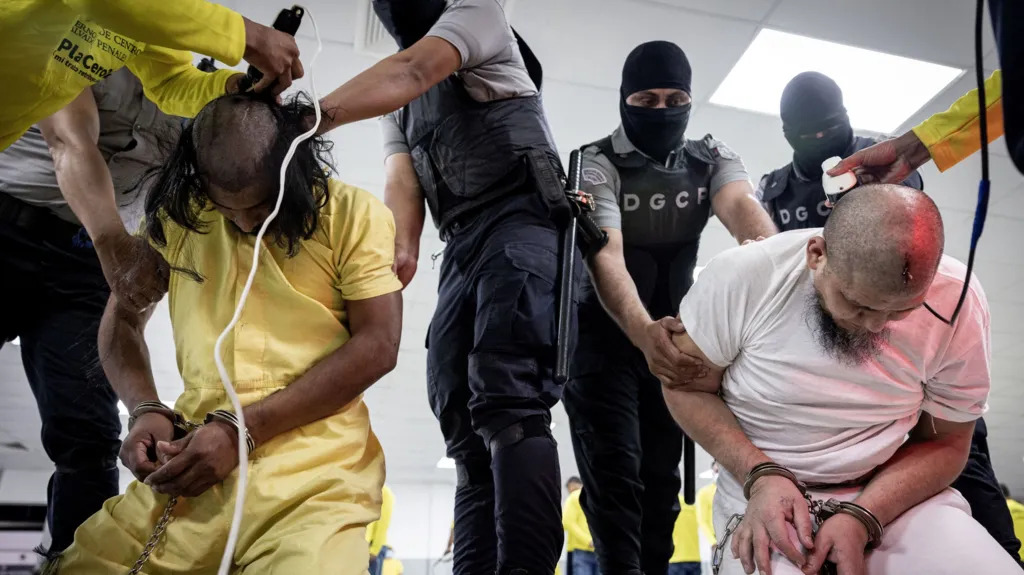In a bold move, the U.S. deported over 200 Venezuelans to El Salvador on Sunday morning, landing them in the Central American nation mere hours after a federal judge ordered the Trump administration to halt the operation. El Salvador’s President Nayib Bukele took to social media to announce the arrival of 238 alleged Tren de Aragua gang members and 23 from the notorious MS-13 gang, gleefully mocking the U.S. court’s ruling with a quip: “Oopsie… Too late.”
The deportees were swiftly shuttled to El Salvador’s sprawling Terrorism Confinement Center (Cecot), a maximum-security “mega-jail” capable of housing 40,000 inmates. Bukele noted the U.S. would pay a “very low fee” for their detention—set for an initial year, with potential extensions—calling it a lucrative deal for his country. The arrangement, hailed by U.S. Secretary of State Marco Rubio as “the most unprecedented and extraordinary migratory agreement anywhere in the world,” underscores tightening ties between Washington and San Salvador.
The deportations stem from President Donald Trump’s invocation of the Alien Enemies Act of 1798, a rarely used wartime law allowing the government to bypass due process and expel individuals deemed threats to national safety. On Saturday evening, U.S. District Judge James Boasberg issued an urgent order blocking these removals and demanding that any planes in transit turn back. Yet, the flights pressed on, raising sharp legal questions about compliance with the judiciary.
Rubio celebrated the operation, declaring, “Hundreds of violent criminals were sent out of our country,” while sidestepping the judge’s directive in his Sunday statement. It remains unclear whether all deportees are convicted criminals or confirmed gang members, fueling criticism from rights groups. Amnesty International USA slammed the move on X as “yet another example of the Trump administration’s racist targeting” of Venezuelans, accusing it of relying on vague gang affiliation claims. Venezuela’s government echoed the outrage, blasting the wartime law’s use as an “unjust criminalization” of its migrants, likening it to “the darkest episodes in human history.”
The American Civil Liberties Union (ACLU), part of a lawsuit challenging the White House, is scrambling to confirm whether the court’s order was defied. “We’re waiting to hear from the government and conducting our own investigation,” said ACLU lawyer Lee Gelernt. The Department of Justice has already appealed Boasberg’s ruling, per CBS News, as the BBC awaits official comment.
Dramatic footage posted by Bukele captures the deportees—hands and feet shackled—being herded off planes by armed guards, some loaded into armored vehicles, others forced onto buses under heavy escort. The convoy’s journey ended at Cecot, a cornerstone of Bukele’s aggressive anti-crime crusade, though the jail’s harsh conditions have drawn flak from human rights advocates.
This latest chapter in Trump’s immigration crackdown—bolstered by his January designation of Tren de Aragua and MS-13 as terrorist groups—reflects his campaign pledge for a historic deportation surge. While illegal border crossings have hit a decades-low since he took office, Immigration and Customs Enforcement (ICE) data shows a dip in deportations: 11,000 in February 2025 versus 12,000 the prior year under Biden, falling short of Trump’s ambitious targets.
Rubio, who thanked Bukele for his “assistance and friendship,” cemented the deal during a February visit—his second foreign stop as America’s top diplomat—where Bukele first floated taking U.S. deportees to offset Cecot’s costs. For now, the standoff between Trump’s agenda and the courts promises more fireworks ahead.

